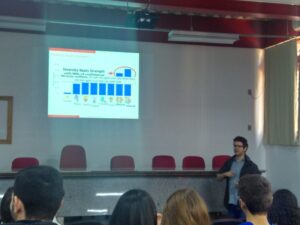Informativo
Palestra: Three Fundamental Pillars of Decision-Centered Teamwork
Three Fundamental Pillars of Decision-Centered Teamwork
Palestrante: Prof. Leandro Marcolino – Universidade de Lancaster no Reino Unido
Local: Auditório do CCE
Dia: 30/05
Horário: 10.00

Abstract:
Teams of agents have been used in many important domains, such as: machine learning, forecasting systems, multi-robot systems, and even board games. In my thesis, I focus on the study of decision-centered teamwork; that is, the analysis of agent teams that iteratively take joint decisions into solving complex problems. Decision-centered teamwork encompasses three fundamental challenges: (i) Selecting a limited number of agents to compose a team; (ii) Combining the opinions of the team members; (iii) Assessing the performance of a given team. In this talk I will focus on Agent Selection and Team Assessment, showing both theoretical and experimental results. I explore three different domains: Computer Go, HIV prevention via influencing social networks and architectural design.
For Agent Selection, I introduce novel models of diversity for teams of voting agents. My models rigorously show that teams made of the best agents are not necessarily optimal, and also clarify in which situations diverse teams should be preferred. In particular, I show that diverse teams get stronger as the number of actions increases, by analyzing how the agents’ probability distribution function over actions changes.
With regards to Team Assessment, I develop a domain independent team assessment methodology for teams of voting agents. My method is within a machine learning framework, and learns a prediction model over the voting patterns of a team, instead of learning over the possible states of the problem.
Finally, I will briefly introduce my model of agent teams for design, where voting agents propose optimal design alternatives for human selection; and my work on influence maximization in social networks, where I consider “real-life” networks, with high degrees of uncertainty and lack of knowledge.
Bio:
Leandro Soriano Marcolino is a lecturer (assistant professor) at Lancaster University. He obtained his doctorate degree at University of Southern California (USC), advised by Milind Tambe. He has published in several key conferences in AI, robotics and machine learning, such as AAAI, AAMAS, IJCAI, NIPS, ICRA and IROS. He received the best dissertation and the best research assistant award from the Computer Science Department at USC, had a paper nominated for best paper from the leading multi-agent conference AAMAS, and had his undergraduate work selected as the best in the nation by the Brazilian Computer Science Society. Leandro completed his masters degree in Japan (with the highly-competitive Monbukagakusho scholarship) and his undergraduate degree in Brazil at Universidade Federal de Minas Gerais (receiving a gold medal for finishing the course with the highest grades). His research interests are multi-agent teamwork, machine learning, robotics; with emphasis on coordination and collaboration. Leandro has conducted this research in the context of a variety of domains, such as swarm robotics, computer Go, social networks, bioinformatics and architectural design.
